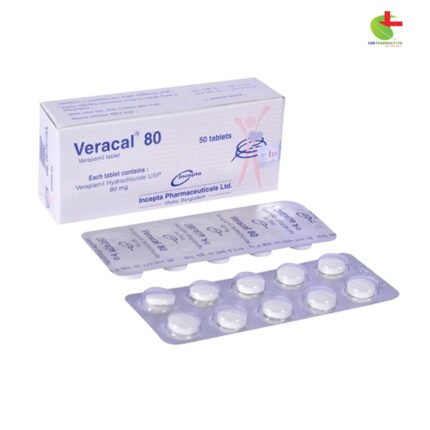Veracal 40
22.50৳ Strip
- Veracal is a calcium channel blocker used to treat:
- Hypertension
- Angina
- Arrhythmias
- It works by inhibiting calcium influx into heart and smooth muscle cells.
- Helps to lower blood pressure, reduce angina, and control abnormal heart rhythms.
- Available in tablet and injection forms, with sustained-release for long-lasting effects.
- Always follow healthcare provider’s instructions for proper use and dosage.
 Brand
Brand
|
Incepta Pharmaceuticals Ltd |
|---|---|
 Generics
Generics
|
Verapamil Hydrochloride |
 Type
Type
|
Tablet |
Indications
Veracal Tablets:
- Treatment of essential hypertension
- Management of angina pectoris and prevention of recurrent myocardial infarction
- Control of supraventricular arrhythmias
Veracal Injection:
- Treatment of tachycardias (e.g., paroxysmal supraventricular tachycardias)
- Management of atrial fibrillation with rapid ventricular response (except in WPWS)
- Treatment of atrial flutter with rapid conduction
- Addressing extrasystoles
- Management of acute hypertension and coronary insufficiency
- Prophylaxis and therapy for ectopic arrhythmias (especially ventricular extrasystoles) during halothane anesthesia or adrenaline administration
Note: Always follow the prescribed dosage from a registered healthcare provider.
Description
Veracal is a potent calcium ion influx inhibitor that limits the inward flow of calcium ions into cardiomyocytes, smooth muscle cells, and the His-Purkinje system. This sustained-release formulation of Veracal ensures prolonged action in the body.
Pharmacology
Verapamil is an L-type calcium channel blocker with well-established antiarrhythmic, antianginal, and antihypertensive properties. Immediate-release verapamil requires multiple daily doses, while extended-release options allow for once-daily administration. Due to its negative inotropic effects, verapamil should not be used in patients with severe left ventricular dysfunction or hypertrophic cardiomyopathy as it may worsen these conditions.
Dosage & Administration
Verapamil Tablets:
- The dose should be personalized based on individual needs and administered with food.
- For hypertension: Start with 180 mg in the morning. If required, increase the dose to 240 mg or adjust by adding a second dose of 180 mg in the evening.
- For angina: Typically 80 mg to 120 mg, 3 times daily.
- For arrhythmias in digitalized patients: Administer 240 mg to 360 mg in divided doses, depending on severity.
Verapamil Injection:
- Adults: Start with 5 mg slowly via IV for tachycardias or hypertensive crises, repeating as needed. Drip infusion can be used at a dose of 5-10 mg/hour.
- Children: Adjust doses based on age and clinical response, starting from 0.75 mg for newborns to 5 mg for children aged 6-14 years.
Interactions
Veracal may interact with various drugs, including:
- Increased plasma levels: CYP3A4 inhibitors (e.g., erythromycin, ritonavir), cimetidine, and certain cardiovascular drugs (e.g., digoxin, beta-blockers).
- Decreased plasma levels: CYP3A4 inducers (e.g., rifampicin), and other substances such as phenobarbital.
- Other interactions: Increased risk of bleeding with aspirin, enhanced bradycardic effects with telithromycin, and potentiation of hypotension when combined with diuretics or vasodilators.
Contraindications
Veracal should not be used in patients with:
- Severe left ventricular dysfunction
- Hypotension or cardiogenic shock
- Sick sinus syndrome (unless an artificial pacemaker is present)
- Second or third-degree AV block (unless with a pacemaker)
- Known hypersensitivity to Verapamil hydrochloride
Side Effects
Common side effects (greater than 1% incidence) include:
- Digestive: Constipation, nausea
- Cardiovascular: Hypotension, edema, CHF, bradycardia, AV block
- Respiratory: Upper respiratory tract infections
- Nervous System: Dizziness, headache, fatigue
- Skin: Rash, flushing
- Hepatic: Elevated liver enzymes
Pregnancy & Lactation
- Pregnancy: Veracal should only be used during pregnancy if absolutely necessary, as it crosses the placenta.
- Lactation: Excreted in breast milk, so nursing should be discontinued during treatment.
Precautions & Warnings
Caution is advised for patients with:
- First-degree AV block, bradycardia, hypotension, or heart failure
- Atrial fibrillation or flutter, especially in pre-excitation syndromes like WPW
- Impaired liver or kidney function
Veracal may affect the ability to drive or operate machinery, particularly during the initial stages of treatment or with alcohol consumption.
Overdose Effects
Treatment involves supportive care. Beta-adrenergic stimulation and calcium infusion can be used to reverse overdose symptoms. Veracal is not removed by hemodialysis.
Therapeutic Class
Calcium Channel Blockers
Storage Conditions
Store below 30°C. Keep away from light and out of the reach of children.













Reviews
There are no reviews yet.